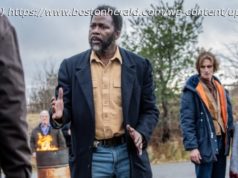Movie review for Martin McDonagh’s film starring Frances McDormand, Woody Harrelson, and Sam Rockwell.
Mildred Hayes ( Frances McDormand) walks into the office of the local billboard company, and the babyfaced man in charge, Red ( Caleb Landry Jones), is reading A Good Man Is Hard to Find, the story collection by mid-century Southern writer Flannery O’Connor. Mildred is there to rent space on three billboards on an isolated back road on the end of Ebbing, Missouri, a tiny town with a welcome sign that proclaims it to be “worth stopping for.” Her intention: To shame the town’s police chief in 20-foot-high letters.
Unless I missed it, O’Connor doesn’t appear again in Martin McDonagh’ s Three Billboards Outside Ebbing, Missouri. But the book’s conspicuous placement in this scene is no accident: It works on several levels as a handy interpretive key. For one, “a good man is hard to find” could have been the film’s working title. For another, O’Connor’s story is about a family that encounters a violent murderer, which is at least thematically related to the movie.
And in a broader, more compelling sense, Three Billboards feels like it could have sprung from O’Connor’s imagination. One of her most famous aphorisms — “the truth does not change according to our ability to stomach it” — is more or less the motto by which Mildred has chosen, or been driven, to live.
Mildred’s decision to publicly shame the Ebbing Police Department doesn’t come from nowhere. It’s the natural arrival point — to her, anyway — of months of frustration after the rape and murder of her teenaged daughter. The local police seem more interested, as she puts it, in “torturing black people” than in actually doing their jobs and finding the perpetrator.
So she erects billboards. The first reads, “Still No Arrests?” Next, “How Come, Chief Willoughby?” And the final one: “Raped While Dying.” And they sure do get attention — from the local media, from Mildred’s ex-husband Charlie ( John Hawkes), from her embarrassed teenage son Robbie ( Lucas Hedges), and indeed from the local police, including Chief Willoughby ( Woody Harrelson) and one of his junior officers, Jason Dixon ( Sam Rockwell), a hapless cop who lives with his mother and doesn’t care all that much about the letter of the law.
Matters escalate as Dixon, in particular, tries to get the billboards pulled down and Mildred fights back. But as the film wears on, it becomes clear that not everything in Ebbing is as it seems. Mildred wears her biggest hurts out in public for the whole world to see, but like everyone in Ebbing, she’s also carrying around private, profound sorrows that complicate her character. Secrets make people hurt one another.
McDonagh is a playwright first and foremost — four of his plays have been nominated for Tonys — and it shows in Three Billboards, which plays out as a darkly comic series of interactions between people who have long histories shaded by old hurts and grudges. Everything surfaces in these conversations (and a few brief flashbacks) and in the way that the characters poke and prod at each other’s wounds and bruises.
Like most playwrights, McDonagh excels at writing pithy and poignant lines that instantly round out his characters, often loaded with witticisms and profanities that sometimes verge on poetry. At other times, though, they feel like barbs and jabs; Ebbing, Missouri, is the kind of town where people sneer at “political correctness” and still feel comfortable throwing around the term “midget” to refer to a character played by Peter Dinklage. But it’s not backward. Mildred is perfectly comfortable dressing down a priest for his complicity in covering up child sex abuse in the church, or excoriating those who’d rather turn a blind eye to the sexism, racism, and general terribleness of the world around them.
And yet Ebbing feels insular, with its own wrongs that nobody quite knows how to right. It’s a place that feels like the world is passing by, and that is precisely what Mildred refuses to take sitting down.
McDonagh’s dialogue requires great actors to deliver it, and Three Billboards has them in spades. The trio of McDormand, Harrelson, and Rockwell all received deserved praise at TIFF — where the film won the coveted People’s Choice Award — and this might be McDormand’s best role since her Oscar-winning turn in Fargo. But the cast of supporting characters is just as good, in particular Caleb Landry Jones, who isn’t, for once, playing either a sleazeball or an addict. (You last saw him as abusive junkie Steven Burnett in Twin Peaks: The Return .)
Every performance in this movie acknowledges that while tragedy is what prompted the film’s events, its contours, characters, and conversations are pure, inky black comedy. Absurdity makes for good humor, and the screwed-up world in which these characters live is nothing if not absurd. Mildred isn’t going to take it sitting down, but by the end even she’s come around to the realization that sometimes there’s nothing to be done. The fixes for tragedies that we come up with as humans are woefully inadequate, to the point you can’t help but sit back and laugh at the ridiculousness of it all, and then try to muddle along somehow.
That sense of the world gives Three Billboards a distinctly O’Connorian cast. O’Connor came to her conclusions about the world’s absurdity — and about the possibility for what she called “moments of grace” to break through in spite of human failing — by being a faithful practicing Catholic. For his part, McDonagh has talked about how his upbringing as an Irish Catholic shaped his view of the world, and his plays and films, especially his 2007 movie In Bruges, are suffused with a sensibility that’s just a couple ticks off O’Connor’s. (That’s also true in the work of his brother John Michael McDonagh, writer and director of Calvary .)
In O’Connor’s South and in Ebbing, Missouri, the world is wild and violent, a gothic mid-space suspended in a creaky old town located somewhere between heaven and hell. Nobody living there, whether they’re obsessed with justice or loving toward their family or just living a banally boring life, is inherently good.
Start
United States
USA — Cinema Three Billboards Outside Ebbing, Missouri is a wise, dark comedy about a...






